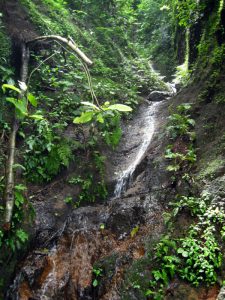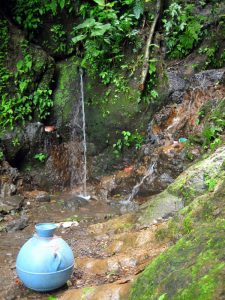Location
Copinol, Canton San Antonio El Rebelde, Municipio de San Vicente, Departamento de San Vicente, El Salvador
Community Description
San Antonio El Rebelde is a small cantón of approximately 650 people (mean and median ages of 25 and 18, respectively) living in 115 houses scattered near the top of the semi-mountainous region of San Vicente close to the ‘cerro Sihuatepeque’. Although pertaining to the relatively richer municipality of San Vicente, El Rebelde is in fact exceptionally isolated and extremely poor. In order to get to the closest town, community members must either trek up and down a steep mountain for an hour and hitch a ride on the highway or take a tedious two-hour bus ride that oftentimes will not run in the rainy season.
The men all work in agriculture, harvesting either corn or beans, depending on the season. Women generally stay at home to care for the house and family, thus generating no income. The average family earns approximately three dollars a day.
Geographically El Rebelde consists of two caseríos, separated by a 15-minute climb up or down the mountain: El Valle (with ~500 people) and Copinol (with ~150 people). The latter population lives under conditions of severe poverty, terrible even by the standards of the rest of the community.
 Of the 23 families that live in Copinol, all of them have ‘bahareque’ shacks made from sticks, mud, and hay with tile roofs and dirt floors. Although 80% of the families have access to electricity, only three are connected to the potable water system from which the upper part of the community drinks. The rest of the families do not have the necessary funds to draw from this supply. Nobody in the Caserio has latrines but rather go ‘saliendo por los montes’.
Of the 23 families that live in Copinol, all of them have ‘bahareque’ shacks made from sticks, mud, and hay with tile roofs and dirt floors. Although 80% of the families have access to electricity, only three are connected to the potable water system from which the upper part of the community drinks. The rest of the families do not have the necessary funds to draw from this supply. Nobody in the Caserio has latrines but rather go ‘saliendo por los montes’.
The daily chore of bringing in water is extremely taxing. The only option for the community is to haul water from a small waterfall a kilometer’s walk away on a steep downward trail of dirt and rock. All of the families bathe and wash their clothes there as well.
This is dangerous for two reasons, which are particularly grave during the rainy season from June to December. First of all, the hike to and back from the waterfall is treacherous. It takes approximately 25 minutes both ways, walking at a good pace in decent weather. However, this is often not the case when the trail is turned into the mud from the rains of the previous day and an individual is lugging back a large jug of water on her head.
Secondly, the waterfall itself is dangerous because rocks often come crashing down to the surprise of the people bathing underneath. In the past two years, one lady was sent to the hospital because a falling rock landed on her head. She was in a coma for a number of days and surprisingly came back out alive. Since this incident, a number of the community refuses to set foot in the waterfall and people are generally cautious and afraid.
 Project Description
Project Description
The project will be to establish a safe source of water for the entire community of Copinol.
Piping will be installed and run from the water source to a level area approximately 150 meters away, where communal pila will be constructed. The terrain will be cleared out to make way for a concrete base upon which the pila will be assembled, allowing for safe and easier access.
The pila will be roughly 4 m x 2 m x 1 m, assembled using concrete blocks over the cement base.
Water Charity funds will be used to purchase the materials, including piping and cement, and to pay for transportation of the materials from the nearby town to El Rebelde.
The community will contribute to the physical labor and maintenance of the system. All of the men of Copinol have agreed to cooperate in bringing the materials down to the site of the pila along with basic terrain clearing and concrete base laying.
The project will be supported by the El Rebelde ADESCO, which has full legal standing and has cooperated on a number of projects in the past. Piping will be arranged by members of the upper community’s water committee and the entire project will be overseen by the Peace Corps Volunteer.
Project Impact
160 people will benefit from the project.
Peace Corps Volunteer Directing Project
Alex Wang
Comments
This is an aqueduct project that will bring clean water from a remote source to a convenient place in the community. It will greatly reduce the time that each family must spend and the risk that villagers take in collecting water each day.
Dollar Amount of Project
$555.00
Donations Collected to Date
$555.00
Dollar Amount Needed
$0.00 – This project has now been fully funded through the generosity of James Berg, of Paradise Valley, AZ, USA.
We encourage others to continue to donate using the Donate button below, and we will notify Peace Corps Volunteer Alex Wang of your donation. Additional funds will be used to fund the next project by Alex and/or those of other PCVs in the country of service.
![]() This project has been finished. To read about the conclusion of the project, CLICK HERE.
This project has been finished. To read about the conclusion of the project, CLICK HERE.